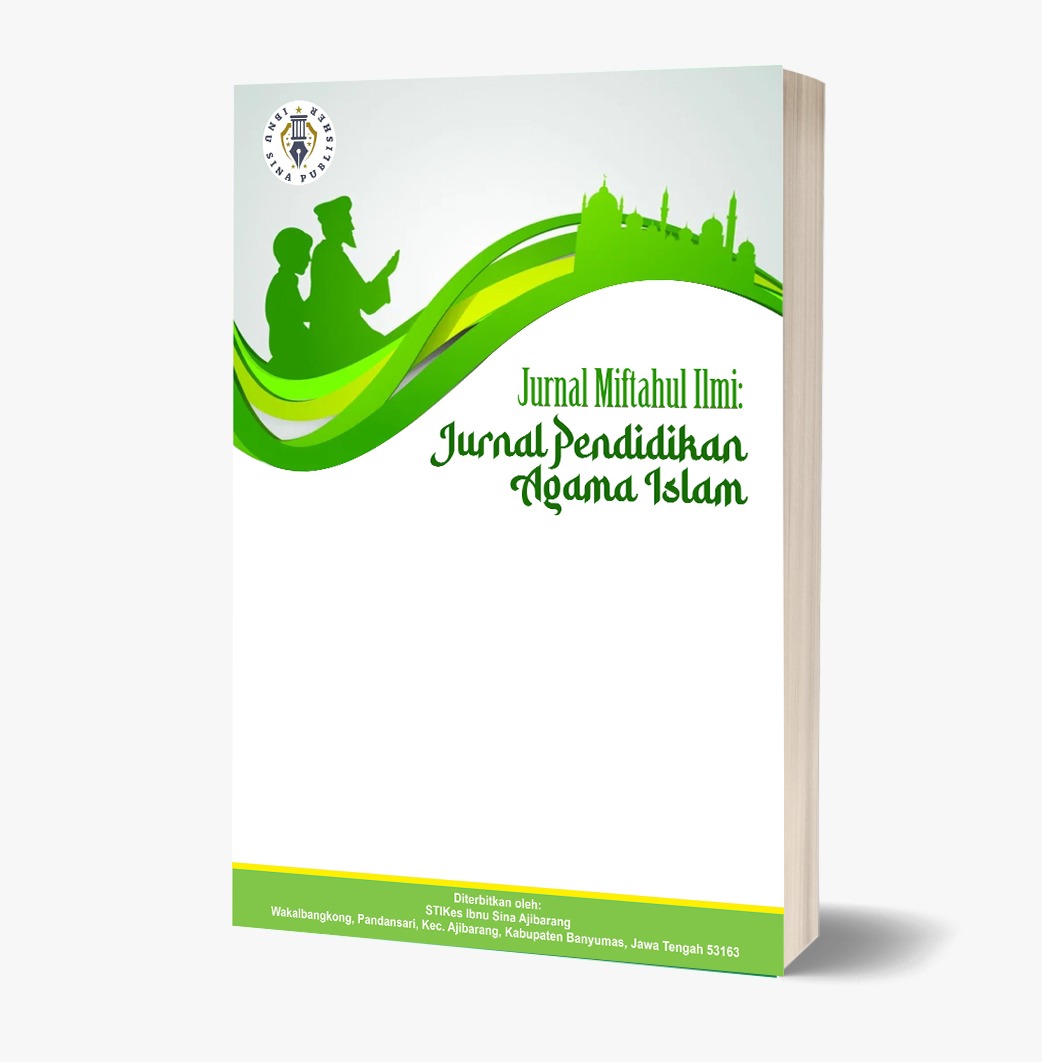Analisis UU TPKS dan Fikih Mubadalah dalam Pembelajaran Fikih Pernikahan di Madrasah Aliyah
DOI:
https://doi.org/10.59841/miftahulilmi.v1i3.119Keywords:
Jurisprudence of Mubadalah, Jurisprudence of Marriage, TPKS LawAbstract
The paradoxical phenomenon of domestic violence (KDRT) within the ideal construct of Islamic marriage, supported by the prevalence of violence against women in Indonesia, forms the empirical basis of this research. Fikih mubadalah, as an interpretative framework that emphasizes the principle of reciprocity in understanding religious texts, and the Law Number 12 of 2022 concerning Sexual Violence Crimes (UU TPKS), as a juridical instrument providing comprehensive protection for victims of sexual violence, constitute the central conceptual elements of this study. This research focuses on the analysis of the implementation of UU TPKS and the fikih mubadalah paradigm within the pedagogical context of the Islamic Marriage Jurisprudence subject in the eleventh grade of Social Sciences at Madrasah Aliyah Negeri (MAN) 1 Banjarmasin. The research method employed is descriptive qualitative, with data collection techniques including participatory observation, semi-structured interviews with students and educators, and documentary analysis of learning artifacts. The research findings indicate that the integration of the fikih mubadalah concept and the substance of UU TPKS in the learning process significantly enhances students' understanding of the essence of egalitarian marital relations and the urgency of legal protection against gender-based violence. Students are able to identify manifestations of gender inequality in marriage case studies and internalize the importance of equality and legal protection guarantees. Nevertheless, heterogeneity in the level of understanding is still identified in a small portion of the sample population. The conclusion of this research is that the internalization of fikih mubadalah and UU TPKS within the Islamic Marriage Jurisprudence curriculum effectively stimulates students' critical awareness of the importance of just marital relations and the imperative of preventing acts of violence. The application of a contextual and participatory pedagogical approach proves to be positively correlated with an increase in students' understanding. This research recommends the adoption of a similar integrative approach in the religious education curriculum as a strategic effort to shape a young generation that possesses legal awareness, a fair gender perspective, and the capacity to build harmonious and violence-free family institutions.
References
Berlianti, D. F., Abid, A. A., & Ruby, A. C. (2024). Metode penelitian kuantitatif pendekatan ilmiah untuk analisis data. Jurnal Review Pendidikan dan Pengajaran, 7(3), 1861–1864.
Fadli, M. R. (2021). Memahami desain metode penelitian kualitatif. HUMANIKA: Kajian Ilmiah Mata Kuliah Umum, 21(1), 33–54. https://doi.org/10.21831/hum.v21i1.38075
Fatoni, M. H., Santoso, B., Hidayat, M., & Baidan, N. (2024). Konsep fitrah manusia perspektif Al-Qur’an dan Hadits serta implikasinya dalam pendidikan Islam. Tsaqofah: Jurnal Penelitian Guru Indonesia, 4(2), 845–856. https://doi.org/10.58578/tsaqofah.v4i2.2408
Harmiinngsih, B. (2022). Hubungan dukungan keluarga dan status ekonomi dengan tingkat pengetahuan pernikahan dini siswa di Madrasah Aliyah Arrahmah NW Pringgarata [Skripsi, STIKes Hamzar].
Husniah, W. O. (2020). Edukasi karir dan dampak negatif pernikahan dini pada remaja Madrasah Tsanawiyah Waburense. Journal of Human and Education, 4(6), 111–121.
Ifrani, I., Utami, S., & Hanifah, L. (2024). Sosialisasi pencegahan perundungan dan kekerasan seksual bawah sadar di Pondok Pesantren Putra Darul Istiqamah Barabai. Jurnal Pengabdian ILUNG (Inovasi Lahan Basah Unggul), 3(3), 533. https://doi.org/10.20527/ilung.v3i3.11296
Ismail, S. (2013). Tinjauan filosofis pengembangan fitrah manusia dalam pendidikan Islam. At-Ta’dib: Journal of Pesantren Education, 8(2), 242–263. https://doi.org/10.21111/at-tadib.v8i2.510
Kurli, A. (2021). Pencegahan perkawinan anak melalui sosialisasi dan edukasi pada siswa Madrasah Aliyah Negeri Sumenep. Abhakte, 2(2), 133–143.
Mayasari, E. (2015). Urgensi pendidikan Islam terhadap pengembangan fitrah manusia. Serambi Tarbawi, 3(2), 41–60. https://doi.org/10.32672/tarbawi.v3i2.1247
Moloeng, L. J. (2002). Metode penelitian kualitatif. PT Remaja Rosdakarya.
Noviani, N. A. (2022). Kecemasan siswa yang mengalami pernikahan dini dan penanganannya (Studi kasus di Madrasah Aliyah No.13 Mattirowalie Kabupaten Bone) [Skripsi, Universitas Negeri Makassar].
Rohmatullah, M. M. (2022). Penerapan metode pembelajaran mind mapping untuk meningkatkan prestasi belajar siswa pada mata pelajaran Fiqih. DIRASAH, 5(1), 2621–2838.
Sugiyono. (2013). Metode penelitian kuantitatif, kualitatif dan R&D. Penerbit Alfabeta.
Syarif, M. (2018). Tugas pendidikan Islam dalam mengembangkan fitrah manusia. Tarbiyah Islamiyah: Jurnal Pendidikan dan Keislaman, 7(2), 208–222.
Widodo, M. (2019). Studi analisis materi pernikahan dalam kitab Fathul Qarib karya Syekh Muhammad Ibn Qasim Al-Ghazi dan kontribusinya sebagai pembelajaran tambahan dalam buku ajar mapel Fikih kelas XI Madrasah Aliyah edisi 2019 [Skripsi, IAIN Ponorogo].

















